Shoulder Lock Adjustable Titanium Plate Video
Shoulder Lock Adjustable Titanium Plate PDF
Shoulder Lock Adjustable Titanium Plate Specification
| PRODUCT NAME | REF | SPECIFICATION | PIC |
Shoulder lock adjustable titanium plate
(Placa de titanio ajustable con bloqueo de hombro) | HP12Z16 | 13×3.4×1.5mm /10×1.2mm 2#white pulling wire 1 pcs
2#White blue tuck line 1 pcs |   |
Avantages of XC Medico's Products
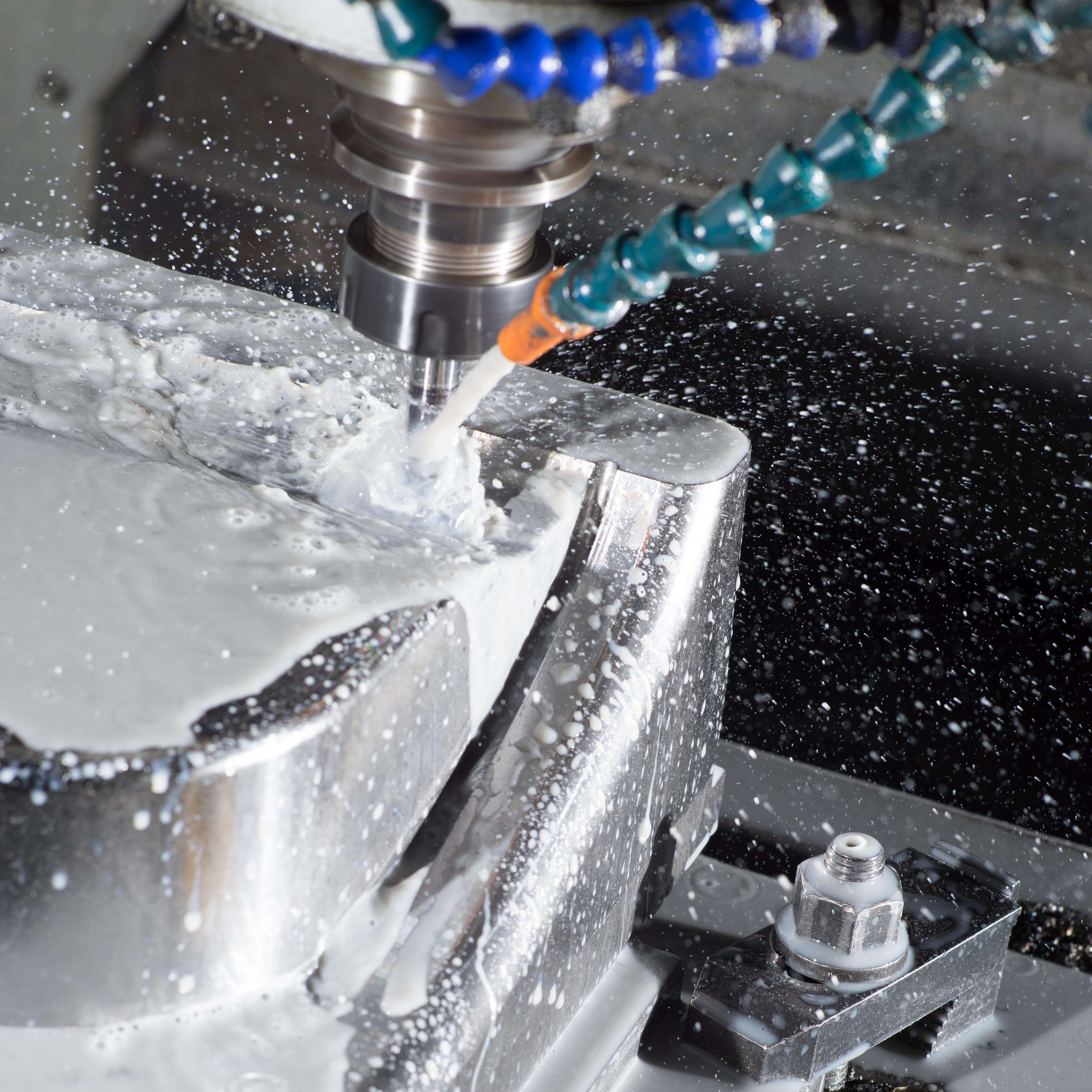
CNC preliminary processing
The computer numerical control technology is used to precisely process orthopedic products. This process has the characteristics of high precision, high efficiency, and repeatability. It can quickly produce customized medical devices that conform to the human anatomical structure and provide patients with personalized treatment plans.
| 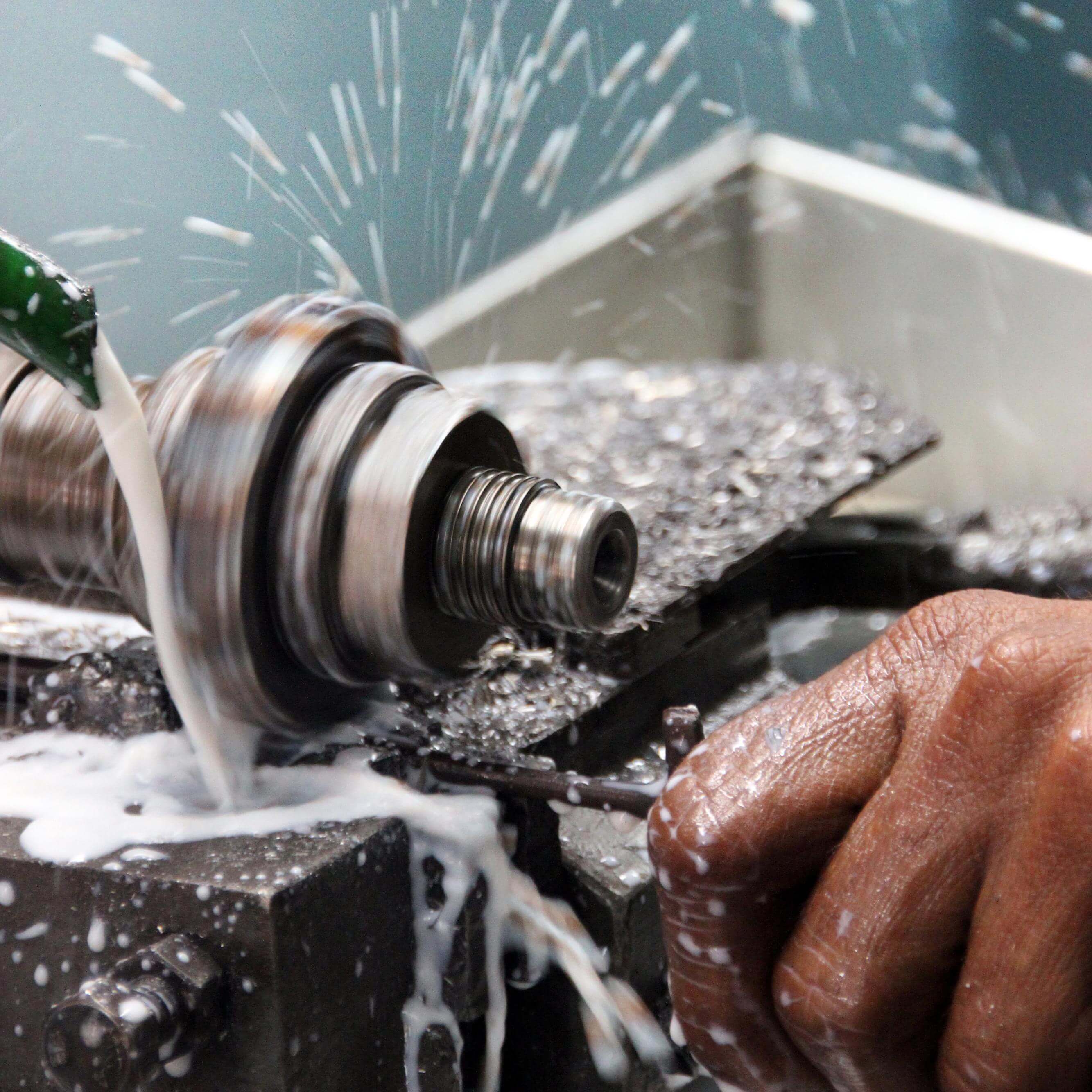
Product polishing
The purpose of orthopedic products polishing is to improve the contact between the implant and human tissue, reduce stress concentration, and improve the long-term stability of the implant. | 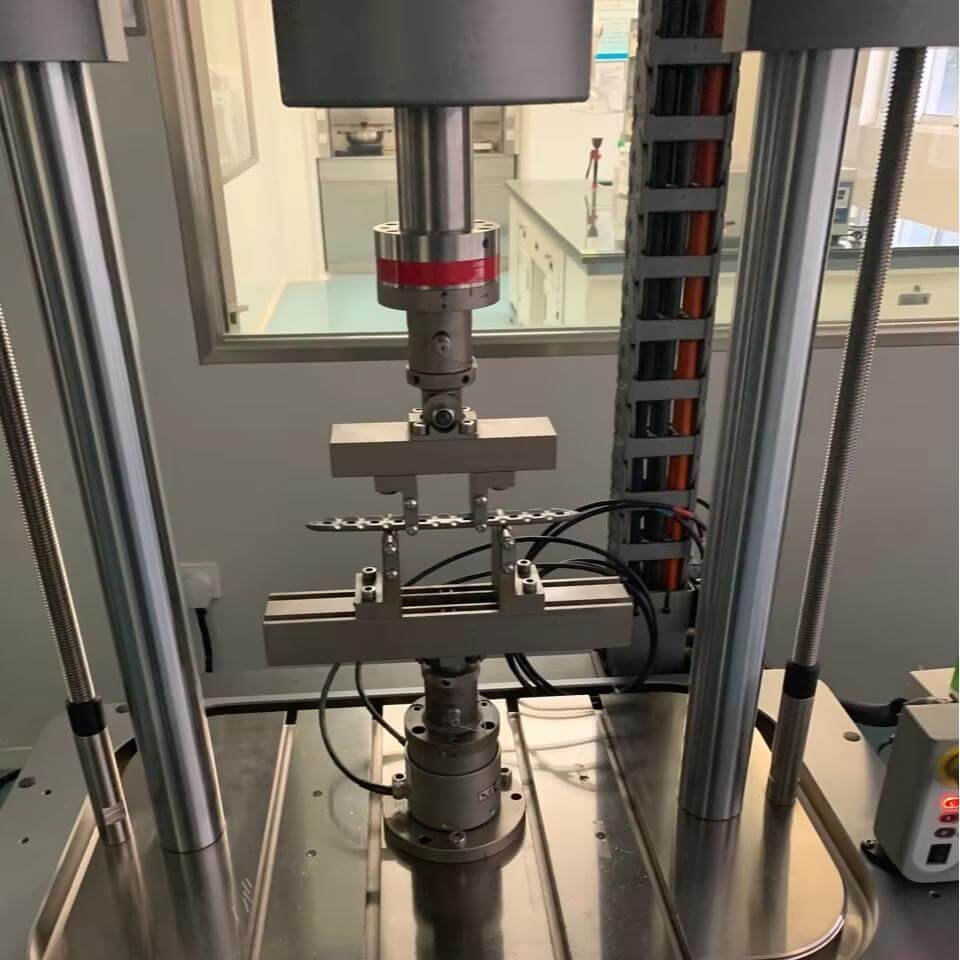
Quality Inspection
The mechanical properties test of orthopedic products is designed to simulate the stress conditions of human bones, evaluate the load-bearing capacity and durability of implants in the human body, and ensure their safety and reliability. |
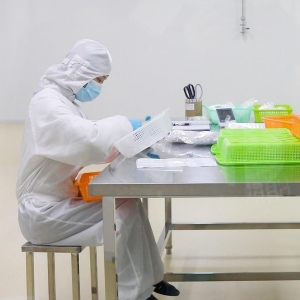
Product package
Orthopedic products are packaged in a sterile room to ensure that the product is encapsulated in a clean, sterile environment to prevent microbial contamination and ensure surgical safety.
|  Product Warehouse Product Warehouse
The storage of orthopedic products requires strict in-and-out management and quality control to ensure product traceability and prevent expiration or wrong shipment. | 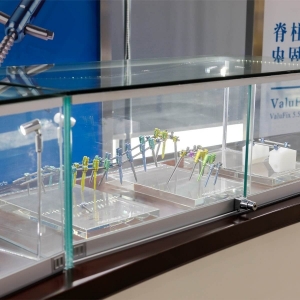 Sample Room Sample Room
The sample room is used to store, display and manage various orthopedic products samples for product technology exchanges and training. |
The Process To Cooperate With XC Medico
1. Ask Xc Medico Team For Shoulder Lock Adjustable Titanium Plate Product Catalog.
2. Choose Your Interested Shoulder Lock Adjustable Titanium Plate Product.
3. Ask For A Sample To Test Shoulder Lock Adjustable Titanium Plate Quality.
4.Make An Order Of Xc Medico's Shoulder Lock Adjustable Titanium Plate.
5.Become A Dealer Of Xc Medico's Shoulder Lock Adjustable Titanium Plate.
The Advantages To Be A Dealer Or Wholesaler Of XC Medico
1. Better Purchase Prices Of Shoulder Lock Adjustable Titanium Plate.
2.100% The Highest Quality Shoulder Lock Adjustable Titanium Plate.
3. Less Ordering Efforts.
4. Price Stability For The Period Of Agreement.
5. Sufficient Shoulder Lock Adjustable Titanium Plate.
6. Quick And Easy Assessment Of XC Medico's Shoulder Lock Adjustable Titanium Plate.
7. A Globally Recognized Brand - XC medico.
8. Fast Access Time To XC Medico Sales Team.
9. Additional Quality Test By XC Medico Team.
10. Track Your XC Medico Order From Start To Finish.
Shoulder Lock Adjustable Titanium Plate: A Comprehensive Guide
Orthopedic surgery continually evolves with advanced implant designs to enhance treatment outcomes, particularly in complex fracture cases. One such innovation is the Shoulder Lock Adjustable Titanium Plate, which has gained recognition for its effectiveness in stabilizing fractures around the shoulder joint. This guide provides in-depth insights into the features, advantages, and applications of the Shoulder Lock Adjustable Titanium Plate, tailored for orthopedic surgeons, medical professionals, students, and journal editors.
What is Shoulder Lock Adjustable Titanium Plate?
The Shoulder Lock Adjustable Titanium Plate is a specialized orthopedic implant designed for the fixation of fractures in the shoulder region, particularly those involving the clavicle, humeral head, or proximal humerus. Unlike traditional fixed plates, the Shoulder Lock plate is adjustable, allowing for fine-tuned modification of the plate’s tension and alignment to achieve optimal bone fixation during the healing process.
Constructed from high-quality titanium or titanium alloy, this plate is engineered for strength, durability, and compatibility with human bone. Its adjustable mechanism enables surgeons to modify the compression and alignment postoperatively, which is crucial for managing fractures that may not initially align perfectly. This ability to adjust during surgery or immediately post-surgery helps ensure more precise and reliable healing outcomes.
Shoulder Lock Adjustable Titanium Plate Features
Adjustability
The primary feature is the adjustable locking mechanism, which allows the surgeon to fine-tune the plate's fit during surgery. This adjustability helps in optimizing the bone alignment and ensuring stable fixation throughout the healing process.
Titanium Construction
Titanium's exceptional strength-to-weight ratio makes the plate strong yet lightweight. It is highly resistant to corrosion and is biocompatible, meaning it integrates well with bone tissue, reducing the risk of adverse reactions.
Anatomical Fit
The plate is designed to conform closely to the contours of the shoulder, allowing for a precise fit that supports natural bone anatomy. This anatomical design promotes better healing and minimizes the risk of plate migration or loosening.
Locking Screws
The Shoulder Lock plate features locking screws that provide a secure connection between the plate and the bone. These screws help maintain the integrity of the fixation even under the stresses of daily movement.
Radiolucent
Titanium plates are radiolucent, meaning they do not obstruct imaging techniques like X-rays or MRIs. This allows for effective monitoring of bone healing and the positioning of the plate post-surgery.
Multiple Sizing Options
The plate is available in various sizes and configurations to accommodate different types of fractures and anatomical variations in patients.
Shoulder Lock Adjustable Titanium Plate Advantages
Precise Alignment and Compression
The adjustable mechanism allows surgeons to achieve optimal alignment and compression, particularly important for fractures that involve the shoulder joint. Proper alignment reduces the risk of malunion or nonunion.
Faster Healing
By ensuring better fixation and alignment, the Shoulder Lock plate promotes quicker and more reliable healing. The improved fixation helps the fractured bone fragments remain stable, accelerating the process of bone union.
Reduced Risk of Plate Migration
Traditional plates can sometimes shift during the healing process, especially if the bone fragments are not adequately aligned. The adjustable locking mechanism of the Shoulder Lock plate minimizes this risk, ensuring that the plate remains securely fixed.
Customizable to Patient Anatomy
The anatomical design and adjustable nature of the plate allow it to be customized for a better fit, ensuring that the plate aligns optimally with each patient’s unique bone structure. This results in better functional outcomes.
Reduced Need for Revision Surgery
The stability provided by the adjustable mechanism reduces the likelihood of complications such as screw loosening or plate failure, which may require additional surgeries to correct.
Less Invasive than External Fixators
When compared to external fixators or other temporary stabilization devices, the Shoulder Lock plate offers a less invasive, more permanent solution, reducing recovery times and minimizing soft tissue disruption.
Precautions For The Shoulder Lock Adjustable Titanium Plate
Surgical Precision
The effectiveness of the adjustable locking mechanism depends on precise placement and adjustment during surgery. Surgeons must be thoroughly familiar with the implant’s features to ensure optimal positioning and secure locking.
Patient-Specific Considerations
The plate may not be suitable for patients with certain contraindications, such as infections, allergies to titanium, or bone conditions that compromise bone quality (e.g., osteoporosis). Pre-operative assessment is essential to ensure the implant is appropriate for the individual patient.
Postoperative Care
Proper postoperative management is crucial for preventing complications such as infection or improper bone healing. Patients must adhere to guidelines regarding weight-bearing and activity restrictions.
Risk of Over-adjustment
While the ability to adjust the plate provides flexibility, excessive adjustment can potentially damage the bone or compromise the stability of the fracture. Surgeons must ensure the plate is not over-tensioned during adjustment.
Plate Removal Considerations
While the plate is designed for long-term stability, it may need to be removed in some cases if complications such as irritation, infection, or abnormal bone growth occur. Surgeons should plan for potential removal based on the patient's progress and healing.
Shoulder Lock Adjustable Titanium Plate Treatment of Fracture Types
Clavicle Fractures
The clavicle is one of the most commonly fractured bones in the shoulder. The Shoulder Lock plate is highly effective for managing both midshaft and distal clavicle fractures, providing secure fixation and promoting proper bone alignment.
Proximal Humerus Fractures
These fractures can be complex and challenging to treat, especially in older patients with weakened bone. The adjustable locking mechanism allows precise alignment of the humeral head, ensuring stable fixation and improving the chances of full functional recovery.
Comminuted Fractures
When the bone is broken into multiple fragments, as is common with high-energy trauma, the Shoulder Lock plate provides stable fixation, allowing for better control over the alignment of all fragments during healing.
Fractures with Displacement
In cases where the bone fragments are displaced, the ability to adjust the plate provides better control over the reduction and stabilization, ensuring that the bone fragments are brought back into the correct position.
Reconstructive Procedures
In cases requiring joint preservation or reconstruction after severe trauma, the Shoulder Lock plate allows for better anatomical restoration and stable fixation during the healing process.
The Future Market For Shoulder Lock Adjustable Titanium Plate
Aging Population
As the global population ages, the incidence of bone fractures, particularly those in the shoulder region, is likely to rise. This will increase demand for reliable, adjustable implants that can effectively treat these fractures.
Technological Advancements
Advances in materials science, such as the development of stronger and more flexible titanium alloys, will further enhance the performance of Shoulder Lock plates. Additionally, innovations like 3D printing will allow for more customized implants tailored to individual patient anatomy.
Minimally Invasive Techniques
As the trend towards minimally invasive surgery grows, adjustable titanium plates will become increasingly popular due to their precision and ability to be used in less invasive procedures that reduce recovery times and minimize patient discomfort.
Rising Healthcare Standards in Emerging Markets
As healthcare infrastructure improves in emerging markets, the demand for advanced orthopedic implants, such as Shoulder Lock Adjustable Titanium Plates, will rise, offering new growth opportunities in these regions.
Focus on Bone Health
Increasing awareness about bone health, combined with improved surgical techniques and implant technologies, will drive the adoption of adjustable fixation devices, contributing to market growth.
Summary
The Shoulder Lock Adjustable Titanium Plate represents a significant advancement in orthopedic implant technology, offering superior strength, versatility, and adjustability in the treatment of shoulder fractures. By allowing for fine-tuned adjustments to compression and alignment, these plates promote optimal bone healing, reduce the risk of complications, and accelerate recovery.
With features such as titanium construction, anatomical fit, and locking screw mechanisms, the Shoulder Lock plate is an ideal choice for complex fractures around the shoulder, particularly in cases where precise alignment is critical. As the demand for advanced fracture fixation grows, particularly with the aging population and the rise of minimally invasive procedures, the future for adjustable titanium plates looks promising, both in established and emerging markets.
By carefully managing surgical precision, patient-specific factors, and postoperative care, orthopedic professionals can achieve excellent outcomes with this innovative implant, ultimately improving patient quality of life.
English
Русский
简体中文
繁體中文
العربية
Français
Español
Português
Deutsch
italiano
日本語
한국어
Nederlands
Tiếng Việt
ไทย
Polski
Türkçe
አማርኛ
ພາສາລາວ
ភាសាខ្មែរ
Bahasa Melayu
ဗမာစာ
தமிழ்
Filipino
Bahasa Indonesia
magyar
Română
Čeština
Монгол
қазақ
Српски
हिन्दी
فارسی
Kiswahili
Slovenčina
Slovenščina
Norsk
Svenska
українська
Ελληνικά
Suomi
Հայերեն
עברית
Latine
Dansk
اردو
Shqip
বাংলা
Hrvatski
Afrikaans
Gaeilge
Eesti keel
Māori
සිංහල
नेपाली
Oʻzbekcha
latviešu
অসমীয়া
Aymara
Azərbaycan dili
Bamanankan
Euskara
Беларуская мова
भोजपुरी
Bosanski
Български
Català
Cebuano
Corsu
ދިވެހި
डोग्रिड ने दी
Esperanto
Eʋegbe
Frysk
Galego
ქართული
guarani
ગુજરાતી
Kreyòl ayisyen
Hausa
ʻŌlelo Hawaiʻi
Hmoob
íslenska
Igbo
Ilocano
Basa Jawa
ಕನ್ನಡ
Kinyarwanda
गोंगेन हें नांव
Krio we dɛn kɔl Krio
Kurdî
Kurdî
Кыргызча
Lingala
Lietuvių
Oluganda
Lëtzebuergesch
Македонски
मैथिली
Malagasy
മലയാളം
Malti
मराठी
ꯃꯦꯇꯥꯏ (ꯃꯅꯤꯄꯨꯔꯤ) ꯴.
Mizo tawng
Chichewa
ଓଡ଼ିଆ
Afaan Oromoo
پښتو
ਪੰਜਾਬੀ
Runasimi
Gagana Samoa
संस्कृत
Gaelo Albannach
Sepeti
Sesotho
chiShona
سنڌي
Soomaali
Basa Sunda
Wikang Tagalog
Тоҷикӣ
Татарча
తెలుగు
ትግንያውያን
Xitsonga
Türkmençe
संस्कृत
ئۇيغۇرچە
Cymraeg
isiXhosa
ייִדיש
Yorùbá
isiZulu


















 Product Warehouse
Product Warehouse Sample Room
Sample Room







